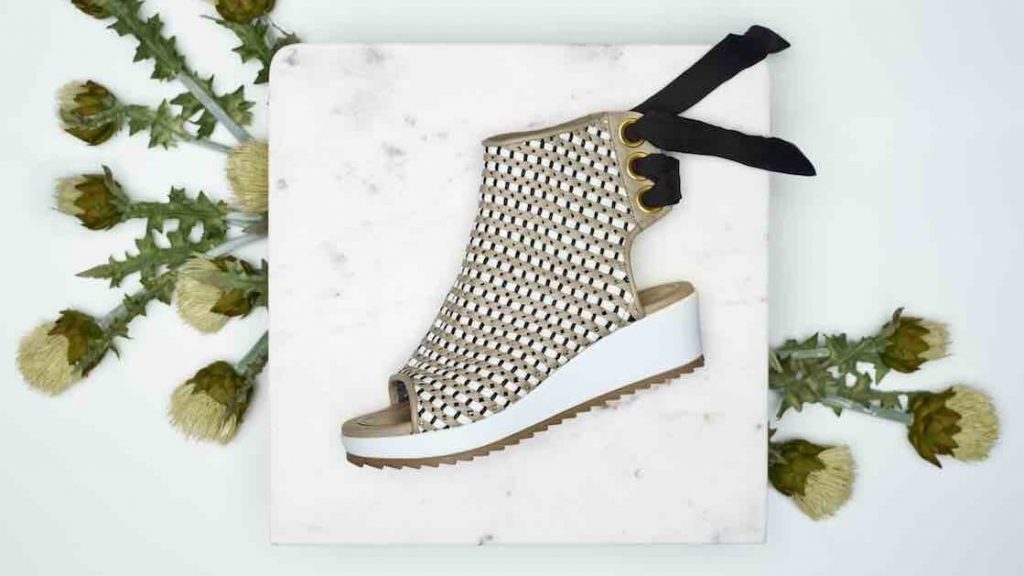Two years ago, Catarina Pedroso took a big step. At the encouragement of her husband, the longtime vegan and lover of luxury fashion, turned her fine art degree toward creating her own line of vegan shoes, the brand Ballūta Shoes.
Pedroso wanted to create a line of shoes for the urban woman: easy, accessible, versatile, yet with a bespoke feel. While there’s no shortage of luxury footwear on the market — some would argue there’s too much of it — these leading brands rely heavily on leather and skins as well as slave labor in factories throughout Asia. That’s no luxury to the growing number of conscious consumers, particularly Millennial shoppers seeking ethical products and more brand transparency. This core demographic is redefining luxury. It’s what drove Pedroso to launch the brand herself.
“My shoes had to be vegan,” she says.
Ballūta’s first catalog, “l-a-n-d,” which only launched in May, has received rave reviews thus far. The collection takes its cue from nature. (“Ballūta” is a take on the Portuguese word “bolota” which means “acorn”.) Pedroso grew up spending a good chunk of time on land her family owned outside of Lisbon, and nature has always inspired and refreshed her. It was a natural anchor for the first collection.
“When thinking about how we would name our brand, we wanted to make sure we chose a name with a meaning that represented our belief in sustainable practices and the effort we put into creating shoes ‘the better way,’” she says.
The line takes a creative spin on the elements, cork abounds as do earth tones, but there’s gold trim, a bit of sparkle and a playful Stella McCartney sensibility, but an artistry that’s completely unique to Pedroso. These aren’t Louboutins by any stretch, and they don’t aim to be. There’s elegance and refinement, but the shoes and boots also speak to a younger audience — creatives who care as much about their own personal style as they do in making sure their fashion choices support their ethos and social causes.
For Pedroso, keeping production in her native Portugal was also a no-brainer, even though it took some research. The Lisbon resident lucked out. Portugal happens to be home to several vegan-friendly footwear facilities. Sydney Brown manufactures there, as does Olsenhaus. While a number of industries have been swallowed up by Chinese factories that can produce faster and cheaper, a number of quality shoe manufacturers in Portugal have survived because of their attention to the craft. Credit in some part goes to the demand for the luxury shoe market, but vegan shoe labels have also found a manufacturing haven in Portugal willing to work with nontraditional materials. Vegan leather, in particular, is not the synthetic vinyl of shoes past.
Ballūta’s vegan leather is made in Spain without the use of any solvents. The textile is crafted from recycled polyamide, which, Pedroso says, looks and feels exactly like leather. And it does. The shoes feel soft and smooth like leather. There’s no vinyl-like glare or rigidity. They’d pass Carrie Bradshaw’s criteria any day.
The shoe lining, too, is a surprising treat. The Italian microfiber is soft and breathable, “the only material that passed our test when it comes to keeping the feet fresh and clean all day long,” says Pedroso.
Then, there’s cork, which makes up the chunk of the heels for Ballūta and a number of other vegan brands as well. Cork trees are native to Portugal, and they’re sustainable, too. A cork tree can lose its bark every nine years after reaching maturity (about 25 years). A cork tree may produce 15 cork harvests in its life.
Ballūta also uses nickel-free metal, and Pedroso’s ensured that most of the materials used in the shoes are certified and produced within the EU. She says staying local reduces the carbon footprint of production as well as helps her to ensure fair labor standards — an issue that a number of luxury brands have faced with producing in Asia. “Traceability is one of our big concerns and we can account for the origins of 90% of the materials involved in the making of a pair of Ballūta shoes,” the website notes.
Pedroso hopes Ballūta can become not only a leading sustainable shoe brand, but also a platform for social change as well. She’s working on capsule collections to feature women artists, soon, and the Fall/Winter collection, “Color Fields,” is set to launch as well, bringing a fresh step into the darker seasons. It’s a significant departure from “l-a-n-d” – bright, unapologetic colors, ribbons, angular boots and wedges with a throwback to the Technicolor 1960s: Cerulian Blue, Burnt Sienna, Cadmium Red, Mars Black, and Titanium White about. But it’s fresh and modern, too. The color combos and the bold lines step right into all that a sustainable and stylish future should deliver.
For Pedroso, the possibilities are endless. “We’re just getting started,” she says. “The market is there and we’re excited to keep innovating, introducing better alternatives, without compromising on quality.”
LIVEKINDLY readers can save 30% on Ballūta Shoes with the checkout code: LIVEKINDLY30. Check out all of the designs here.


